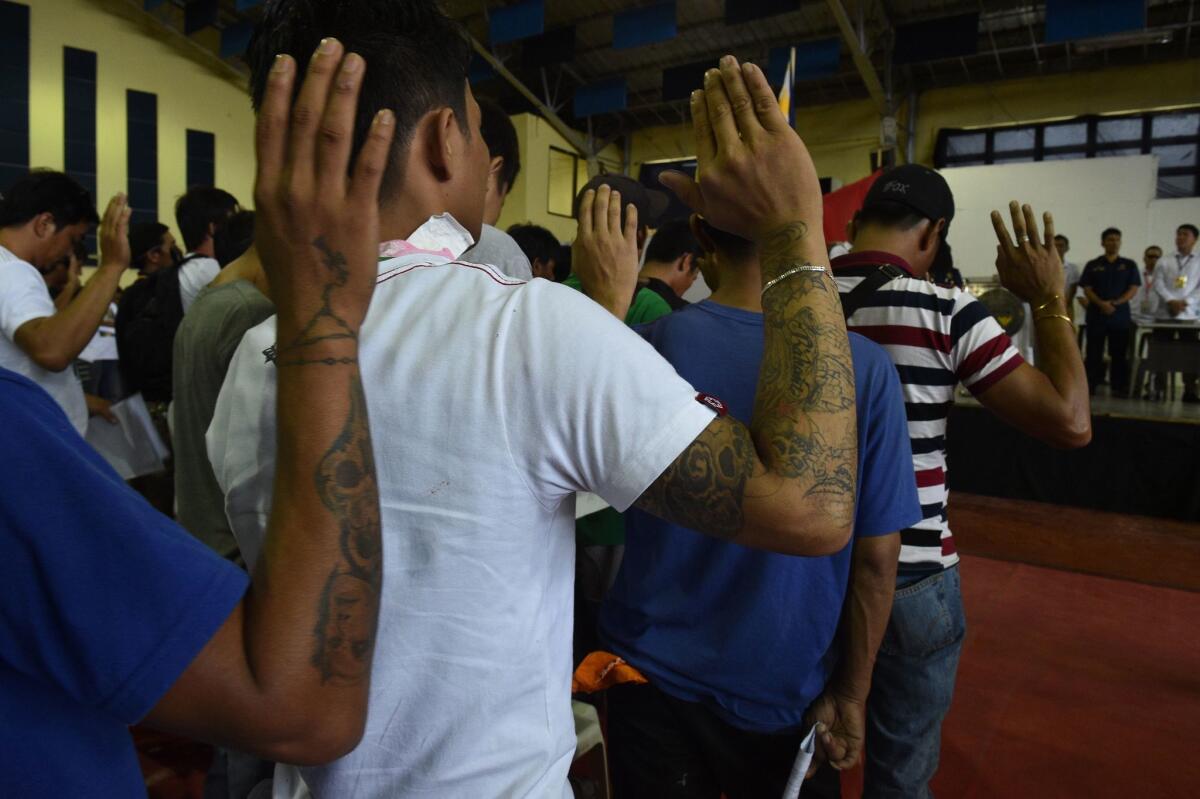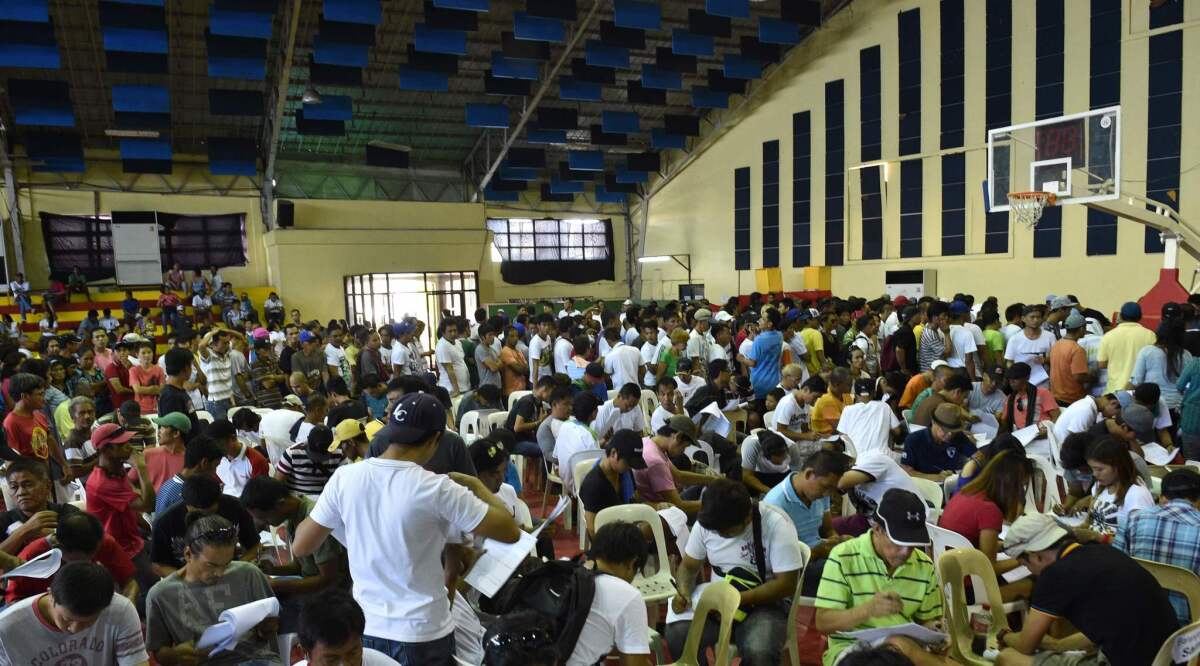The Philippines’ drug addicts, shunned by society and hunted by assassins, find they have nowhere to turn

- Share via
Reporting from Parañaque City, Philippines — For two decades, Jerry Gonzaga was addicted to drugs. Like many of his neighbors and friends in Parañaque, a city south of Manila, Gonzaga would take shabu, an inexpensive amphetamine, to keep him focused on fixing cars, selling umbrellas, and doing other odd jobs to feed his wife and eight children.
Then, on June 30, Rodrigo Duterte assumed the Philippine presidency on promises to kill scores of drug users — and Gonzaga, a wiry 43-year-old, tried to turn himself in to police. At the station, officers made him sign a form pledging to stay off drugs. “It said, ‘If you’re caught the first, second and third time, there are warnings and conditions,’” he said. “‘If you’re caught a fourth time, we’ll have nothing to do with whatever happens to you.’”
Then, the police turned him away.
Since June, an estimated 687,000 people across the Philippines have surrendered to police as Duterte has delivered on his brutal promise. Since he came to power, more than 3,500 suspected drug users and dealers have been killed, some by police, others by shadowy vigilantes.

His anti-drug campaign, conducted in flagrant disregard of international standards of human rights or due process, has strained the country’s already-overburdened corrections system. Its courts are notoriously slow and corrupt; its jails are bursting; and its rehabilitation centers are scarce, numbering 50 nationwide. Experts say that drug dealers are at risk of falling back on their old habits as soon as the climate of fear subsides.
The president estimates that 3.7 million of the country’s 100 million people are drug users, and many are like Gonzaga — poor, terrified of the spike in extrajudicial violence, and struggling to navigate a society that lacks the resources to help them.
“People are living in absolute fear,” said Clarke Jones, a researcher at the Australian National University who studies the Philippine prison system and its relationship with the drug trade.
Meet the Nightcrawlers of Manila: A night on the front lines of the Philippines’ war on drugs »
“I think they’re realizing that if they don’t give themselves up their lives are in jeopardy. But an addict’s an addict.”
“It’s a temporary motivation — you’re about to lose your life, better give yourself in,” he continued. “But if they’re in the criminal justice system, if they’re put in prisons or jails, that doesn’t address their dependency. Drugs are still available throughout the prison system, in different forms. If they remain in the community, there’s no community support structure to keep them off drugs. Drugs are going to go underground for some time, but they’re not gonna go away.”
Duterte, 71, has repeatedly reaffirmed his commitment to a violent, hard-line drug policy — “shoot [the drug dealer] and I’ll give you a medal,” he said on national television in June — and the country’s addicts have cause to take him seriously.
On Thursday, a witness at a senate investigation testified that Duterte himself ordered extrajudicial executions during his 22-year tenure as mayor of the southern city of Davao. Edgar Matobato said that he belonged to a group of vigilante killers nicknamed the Davao Death Squad, which assassinated more than 1,000 people in the city; that Duterte ordered several killings; and that Duterte himself once killed a Department of Justice agent with an Uzi. (On Thursday, Duterte’s communications secretary Martin Andanar denied the claims).
The rehabilitation program at New Bilibid Prison, the country’s biggest correctional facility, with more than 23,000 prisoners, is already bursting at the seams. On a rainy August afternoon, its hallways were bustling. In one room, inmates watched a dance performance by the program’s “glee club”; in another, they had their teeth pulled by a team of volunteer dentists.
The number of surrenders under Duterte has been “overwhelming,” said Resurrection Morales, the prison’s head of reform programs. “It’s mind blowing for the correctional officers to think about these hundreds, thousands of drug defendants turning themselves in.”
Morales said that so far, detention centers, not prisons, have taken the brunt of the drug war — courts are still processing scores of drug-related cases — but that her staff was bracing for a huge wave of new inmates.
“We need the facilities,” she said. “There are so many arrests, but people don’t have the facilities.”
She said that the prison was operating at 158% of capacity, that 40 prison guards were often left in charge of more than 15,000 inmates, and that inmates have a medical allowance of only 10 cents per day, creating the looming specter of a public health crisis.
“Since we lack personnel, a prison guard might do administration work, and reform work -- I have prison guards who are teaching, who are maintaining order in classrooms, who are doing communications as part of their administrative functions,“ she said. “We just have to be prepared for another increase in the number of convictions.”
Archie Bueno, 46, a prisoner at New Bilibid, said that he was incarcerated for drug dealing in 2008, after a five-year trial. “The system is very slow,” he said. “A lot of people come in and only a few come out. There are a lot of prisoners here who are very qualified to leave, on parole. But they can’t leave.” Some, he said, are more than 70 years old.
“As the place gets more crowded, life here is getting harder,” he continued. Some cells, he said, are designed to accommodate 40 prisoners; instead, they’re accommodating more than 100.
“There are cells here where you can’t even sleep a full night,” he said. “Prisoners can’t even stretch out. You get up, you go to the restroom, and you come back and your space is gone.”
Gonzaga, the Parañaque drug addict, says that he’s been off drugs for months, but he’s bracing for an uncertain future.
“Many are worried because of the way the government has decided to fight drugs,” he said. “The government should consider that these people are also human — they have families, people who care about them. They should be given a second chance.”
ALSO:
The Philippines has 1.8 million abandoned children. Here’s what keeps many from adoption
Nearly half a million U.S. citizens are enrolled in Mexican schools. Many of them are struggling
More to Read
Sign up for Essential California
The most important California stories and recommendations in your inbox every morning.
You may occasionally receive promotional content from the Los Angeles Times.













